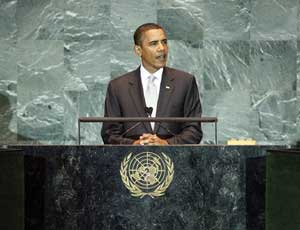Hope for a major breakthrough on climate at the G20 has faded in the environmental and international NGO community, and many are dubious about what might come out of the summit Friday.
“Expectations have really fallen in the past few weeks,” says Kirstine Hughes, head of the public policy and advocacy for Oxfam Great Britain. After less-than-breakthrough meetings of the G8, G20, Major Economies Forum, and the United Nations this past year, she speculates that people are now “summited out.” “It’s almost as if there are too many meetings, too many overlapping agendas.” And there are still more questions than answers on Obama’s anticipated pitch to end fossil fuel subsidies, the other major climate-related topic this week.
There may yet be signs of progress—if leaders emerge with specifics. With several major summits to go before the big climate talks this December, including two meetings of the Major Economies Forum and a meeting of finance ministers in November, solid commitments from leaders now could still lead to a deal in Copenhagen.
On financing (which Rachel Morris covered in an excellent post this morning), Hughes argues that leaders will need to come up with some dollar figures this week, even if it’s only for the near-term. And any financing plan has to acknowledge the historical responsibility of developed nations for emissions, as well as their responsibility to help poorer nations transition. “If you’re serious, you actually recognize that a deal needs money,” says Hughes. “It’s not the end of negotiations tomorrow, but if you want to get the negotiations going, you have to put some credible financial offer of some sort on the table.”
So far, only the European Union has given a specific figure, offering last week to devote $15 billion to aid developing nations.
There may be more hope for progress on Obama’s fossil fuel subsidies pitch. While it’s still not clear what leaders will even consider as subsidies—especially whether subsidies will include tax breaks as well as direct incentives—some agreement on this issue could be significant. And, if the political will is there, it could also free up some funding for financing.
But the subsidies suggestion won’t likely be an easier sell to the US Congress than binding cuts or financing. Congress has had a hard time ending subsidies in the past. Last fall, attempts to close a tax loophole for the oil industry in order to fund the extension of renewable tax credits failed repeatedly. And though Obama proposed ending some subsidies for oil and gas in his 2010 budget, so far Congress has not acted on that directive.
“They’re basically seen as entitlements rather than subsidies,” says Alden Meyer, director of strategy and policy for the Union of Concerned Scientists. “It’s not going to be easy politically, but I think if they get agreement here and can say that other countries, particularly developing countries, are beginning to act, then they have an argument to go back to Congress and say, look, we’re serious too.”














